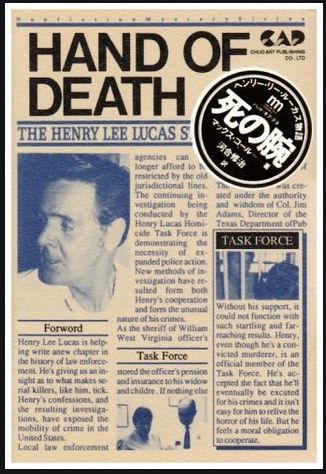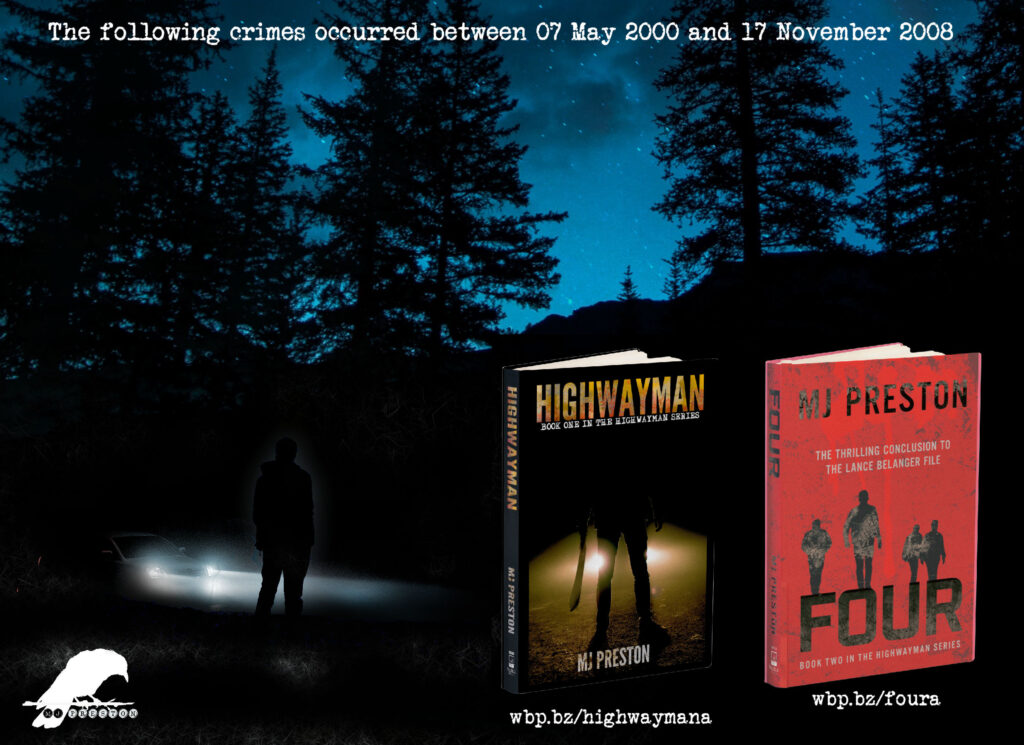PART III – WHERE FICTION AND FACTS COLLIDE

I believe the approach of most writers of any given genre is to write what you know. Of course, unless you’re a cop and you want to write about things that relate to law enforcement and homicide you have to do research or someone, who is in the know, is going to come along and hand your ass to you. And even if you do the research, watch the docs. talk to investigators, to true crime writers, read police reports and immerse yourself in this stuff, you can still get handed your ass. But you know what? That’s the nature of the beast, and I believe that most law enforcement officers are also willing to forgive if the story is inviting enough. In a candid conversation, I had with a veteran police officer via chat he complimented the Highwayman series. We talked about quite a few things, including the Highwayman’s MO, some of the triggers, and compartmentalization. It was a really cool interaction. He loved the books by the way. He did the audio. He did drop one parting observation. This isn’t verbatim, but he said, “We would have picked him up in Portland, Oregon.” In reference to, the Highwayman being questioned in a traffic stop that involved them taking his name. That’s not what happened, and though I could analyze the shit out of this, I know two things. 1. They didn’t get him in Oregon. 2. “We would have got him in Portland, Oregon.” Made me smile, and here’s why. If I have a reader who is considering those things means that I have invoked thought through storytelling. Or I just got my ass handed to me by someone who professed to love the book. Guilty on both counts, but Highwayman didn’t get grabbed in Oregon for reasons beyond this author’s control. In defense, he wasn’t finished! Okay, enough of my rambling, let’s talk about serial killers and crime fiction.
In fiction, the psychopathic serial killer is often inspired by actual cases. For instance, in Robert Bloch’s novel, PSYCHO, Norman Bates had a mother complex. Bates is driven to kill by the abuse of an overbearing mother who tells him that sex is dirty and that the women he lusts for are morally bankrupt and must be destroyed. Wisconsin cannibal, murderer, and seamstress, Ed Gein, inspired Bloch’s story. Gein’s twisted relationship with his mother continued right up until her death. She had scolded both her boys about the evils of women. He boarded up his mother’s room and got about the business of turning himself into what his mother hated most, a woman. He took nocturnal trips to the graveyard, where he harvesting body parts to fashion skull soup bowls and lampshades and chairs upholstered in human skin. Ed Gein is the first that comes to mind with mother issues, but one in a long list of killers who had problems with their mother. Henry Lee Lucas, a drifter serial killer, claimed he was abused emotionally and physically by his mother. Lucas claimed his mother wanted a girl and dressed him as so when he was a child. In my last blog, I wrote about co-ed killer Edmund Kemper who also had mother issues.
An obsessive-compulsive mother raised serial killer Charles Albright. His mother took him into polio wards and made him change his clothes multiple times during the day to keep from him getting dirty and becoming sick. Albright is known for killing his victims and taking their eyes.
All claimed to have suffered either sexual, physical, verbal abuse, and even all three at the hands of their mother. Abuse is often a connective piece in the puzzle of what makes a serial killer. This must be tempered by the understanding is that most of these killers are also known manipulators, and masterful in deception and untruth.

Henry Lee Lucas claimed to be a part of an organization known as THE HAND OF DEATH, where multiple serial killers met to indulge in ritualistic killing and even cannibalism. Lucas’ confessed to killings into the thousands and was quickly discredited. So, as to whether his mother dressed him up like a girl and turned him into the monster he most definitely was, will always be suspect.
An appalling example of a mother complex is Robert Willy Pickton, a pig farmer from Port Coquitlam, B.C., credited with the murders of 49 sex trade workers from the Vancouver area. In her book, ON THE FARM, the author, Stevie Cameron, recounts how as a youth, Pickton’s brother, Dave, accidentally hit a neighbor kid with his vehicle on a rural road. His mother allegedly went to the accident scene and rolled the severely injured young man into a slough that ran beside the road. The victim, a 14-year-old boy named Tim Barrett, was alive at this time and reportedly drowned. Clearly, Pickton was a product of his upbringing, exposed to an abusive life to a mean-spirited woman that would transform Willy into a monster. After being apprehended, he confessed to a jailhouse informant that “it was going to be big when it broke.” Pickton was disappointed that he didn’t make it an even 50, but he got sloppy.
Pickton, Gein, Kemper, all of these men fit into the stereotypical mother haters who manifest their rage through murderous acts against innocent women. Some even have physical stereotypes, but most are chameleons, moving among us unseen. Pickton, in particular, looks like the serial killer you might find in a Rob Zombie movie. He is unkempt with stringy hair, a strange face, and lacking in education. But even for his social lacking, limited intelligence, one is left to ponder whether that is merely the skin Pickton wears. After all, this is a man who lured 49 women off the streets of Vancouver with the promise of drugs and money. Instead, he killed and dismembered them, feeding their remains to the hogs on his farm. Pickton was especially proficient in procuring victims from the unfortunates of society and most often exploited by serial murderers. Sex workers and the drug-addicted are soft targets. They are often nomadic and they aren’t accounted for by friends and relatives because most are off the grid of societal norms.

Another interesting thing I learned researching these killers is how they adapt and evolve. Arthur Shawcross was a serial killer who operated in Rochester, NY. He was known as the Genesee River Killer because he left the bodies of his victims in the river or in proximity to the river. Police discovered Shawcross was returning to the crime scene and after they discovered the body of a new victim they decided to stake it out. Shawcross ate his lunch at the scene of his last murder and was picked up for questioning. Shawcross claimed to have been molested by his aunt, but his


